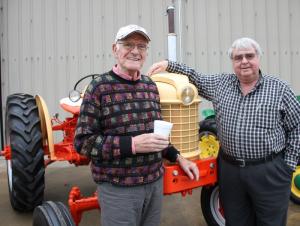Farmers talk aerial spraying and barbecue at Chorman's airfield

Farmers from all over the Delmarva Peninsula - about 500 strong - gathered at Allen Chorman’s Greenwood airport last week to talk crops, hunting, beef barbecue, raw oysters and aerial spraying.
Here are a few of the questions and answers that came up during a presentation by Dr. Dennis Gardisser, a pilot, former engineering professor at University of Arkansas and expert in aerial application.
Q: What are the most important factors in successful aerial application for seeding and fertilizing crops, and spraying crops and wetlands for insect and weed control?
A: Uniformity of the spray pattern and droplet size. “You want all the material you paid for down into the canopy of the plants,” Gardisser told the farmers. “A uniform spray pattern gives good coverage. Small droplet size means broader coverage. Larger droplet size means less drift. It’s important that the droplet size be just right. That’s why the spraying systems on these planes get calibrated every day.”
Q: What’s the optimum spraying height for planes flying above a field?
A: Twelve feet. (So, does that answer any questions about whether crop dusting can be hazardous?)
Q: What’s the propeller on the front of the airplane for?
A: To provide the power and lift to get the aircraft off the ground and moving forward. WRONG. The prop is on the front of the airplane to keep the pilot cool. If it stops turning, watch him sweat!
Jeff Chorman, along with his father, Allen, manages the company’s diverse and expanding aerial application business. They hosted two days of luncheons and Gardisser presentations - at the Greenwood facility and at another airstrip they own in Laurel - to show their appreciation for those who contract their services and to expand their customers’ knowledge base about aerial application. It’s the time of the year when the crops are in and farmers can spare some daylight hours for an event like this one. And, 95 percent of Chorman’s business deals with agriculture - spraying for weeds and pests, seeding and fertilizing.
Big business and growing
In the 27 years Allen Chorman Inc. Aerial Spraying has been in business, the company has grown from a couple of used airplanes purchased when Allen Chorman bought the business from Joe Hudson in 1987, to 21 new and used airplanes and a Bell helicopter. Their newest plane is a 600 horsepower Thrush 550 turbo jet - a low-maintenance, fuel-efficient plane that can carry 200 gallons of fuel and 500 gallons of spray.
Headquartered in Milton, the Chorman company also operates out of airstrips it owns in Snow Hill, Hurlock, Preston, Ridgely, Smyrna and Greenwood. It employs several pilots and mechanics. In addition to its work for Delmarva’s important agricultural community, Chorman also sprays for mosquitoes with planes and the helicopter, flies waterfowl counts for Delaware’s Division of Fish and Wildlife, and surveys artificial reef sites in Delaware Bay and the Atlantic Ocean to gauge how well they are being used by commercial and recreational fishermen.
“We stay busy,” said Jeff. He prefers flying to speaking.
Allen said he started working on Joe Hudson’s farms in the Milton and Cool Spring area when he was 10 years old and caught the flying bug from being around Hudson’s airplanes at the airfield now known as Eagle Crest. He became Hudson’s chief pilot and worked many years in that position before buying the business.
Hudson, one of those who attended the Chorman luncheon, said he established the spraying business in the early 1950s. “I had learned to fly at Rehoboth Airport, went to work spotting fish for Otis Smith’s menhaden operation, and then moved into aerial spraying after the end of World War II. “There were lots of surplus airplanes and pilots looking for work, so I decided it was a good time to try business for myself.”
The long and successful flying careers of Hudson and Chorman earned them a place in Delaware’s Aviation Hall of Fame in 2013, something both men are very proud of.
“We’ve been very lucky and very blessed,” said Allen.




















































